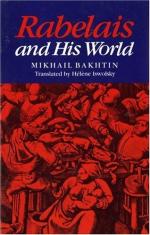
|
| Name: _________________________ | Period: ___________________ |
This quiz consists of 5 multiple choice and 5 short answer questions through Chapter 6, Chapter 2 - Language of the Marketplace Cont..
Multiple Choice Questions
1. The prologue of _Pantagruel_ is a parody and travesty of:
(a) The pomp and circumstance of the aristocracy.
(b) The fables of ancient Greece.
(c) The ecclesiastical persuasiveness of the Church.
(d) The ignorance of the peasantry.
2. To what does Veselovsky compare Rabelais?
(a) An ironfisted dictator.
(b) A pious priest.
(c) An elderly scholar.
(d) A village boy.
3. Why, according to Bakhtin, is Rabelais' parody of the Church not considered heresy?
(a) Rabelais maintains a comic style, so no one could mistake him for being serious.
(b) The Church received an annual tribute from Rabelais, so it overlooked his parodies.
(c) The clergy paid no attention to Rabelais' works.
(d) Rabelais follows every criticism with heartfelt praise.
4. What does Bakhtin consider the most indispensable element of folk culture?
(a) Fables.
(b) Carnival.
(c) Marriage.
(d) Death rituals.
5. Rabelais' description of Alcibiades reflects:
(a) The image of Rabelais himself.
(b) The idea that ancient philosophies were incorrect.
(c) The good/evil dichotomy of mankind.
(d) The abuse/praise dynamics of the marketplace.
Short Answer Questions
1. Comic rituals in Medieval and Renaissance Europe were:
2. Why, according to Bakhtin, does Rabelais treat excrement ambivalently?
3. In Rabelais' time, why was the meaning of debasement often ambivalent?
4. What was the reception of Rabelais' work in the eighteenth century?
5. How did Rabelais obtain the material for his writings?
|
This section contains 384 words (approx. 2 pages at 300 words per page) |

|




